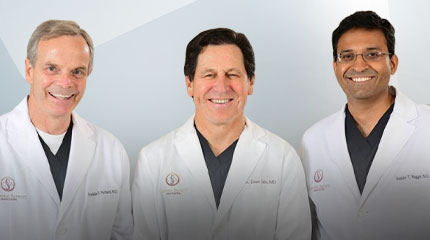Your Guide to General Anesthesia
Conveniently located to serve the areas of Maryland, Virginia and Washington, D.C.
Posted on June 28, 2021 under Cosmetic Surgery
If you’re opting for major surgery, there’s a good chance it’ll be performed while you’re under general anesthesia. That’s because it’s one of the most effective ways to make sure you remain asleep and pain-free during your plastic surgery procedure. It can cause some anxiety, however, especially when there are risks that come with it. Keep in mind that complications are rare when you select a board certified plastic surgeon and qualified anesthesiologist. Here’s what to know about general anesthesia and what to expect.
Reasons for General Anesthesia
General anesthesia is recommended above local anesthesia or light sedation in certain cases. Most procedures can be performed without putting you fully to sleep. However, general anesthesia tends to be recommended in some cases. Your plastic surgeon will likely recommend general anesthesia when needed.
Risks to Consider
For the most part, general anesthesia is safe to use as long as the procedure is guided by a trained anesthesiologist. You’re more likely to develop complications if you have poor physical health or are undergoing a particularly risky procedure. Additionally, not following pre-operative steps can also put you at greater risk during your procedure.
A variety of conditions might increase the risk of complications. These include cardiovascular conditions, lung conditions, kidney conditions, diabetes, seizures, sleep apnea, and smoking. Some medications might increase complication risk as well. Your plastic surgeon will go over the risks at length during your appointment so you know what to expect.
Preparing for Surgery
Your plastic surgeon will give you detailed instructions on how to prepare for surgery. You will likely need to avoid eating and drinking for at least six hours. If you regularly take medications, you’ll need to talk with your regular physician about when to take them before surgery, along with whether to skip any doses.
Medications like blood thinners should be avoided for a minimum of one week before the procedure. That’s because these medications can cause excess bleeding. You will also need to avoid certain herbal supplements.
People with sleep apnea should tell their plastic surgeon and anesthesiologist about their condition. They will need to be monitored more closely to make sure their breathing is okay.
What to Expect
Prior to your procedure, your plastic surgeon will go over your medications, health history, allergies, and any past experiences under general anesthesia. The medication will be given to you with an IV and with a breathing mask. To protect your airway, the anesthesiologist will use either an airway mask or a breathing tube. The anesthesiologist will monitor you continually throughout the surgery.
After your procedure, you’ll wake up slowly in the recovery room. Our team will monitor you to make sure you’re feeling okay and help you get ready to return home with the help of a friend or family member.
Schedule a Consultation
Dr. Jabs, Dr. Richards, and Dr. Magge are fully trained and board-certified plastic surgeons on our team at Cosmetic Surgery Associates in Bethesda, Maryland. To schedule a consultation and discuss your cosmetic surgery options, fill out the contact form or give our office a call.
Our Plastic Surgery Associates team includes Dr. Franklin Richards, Dr. A. Dean Jabs, and Dr. Keshav Magge. Each of our plastic surgeons is board-certified, and together they have over 60 years of combined experience. Drs. Richards, Jabs, and Magge are all highly qualified in procedures for the face, breast, and body, and pride themselves in providing excellent results through our state-of-the-art, Quad A certified operating centers






